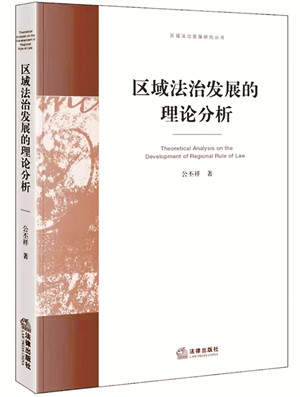


Theoretical logic of regional rule of law

Theoretical Analysis on the Development of Regional Rule of Law
The unique practices of regional legal development in contemporary China have become a vital part of the broader effort to comprehensively advance the rule of law across the nation. In recent years, the study of regional rule of law has become a prominent topic in legal research, leading to significant theoretical progress. Theoretical Analysis on the Development of Regional Rule of Law, by Gong Pixiang, director and professor of the Institute for Chinese Legal Modernization Studies at Nanjing Normal University, preliminarily constructs a theoretical logic system of regional rule of law with distinctive Chinese characteristics.
Regarding the legal philosophy guiding regional rule of law, Gong systematically elaborates on the Marxist philosophical principle of “unity in diversity,” while creatively adapting and applying the Western analytical method of “individualization,” particularly as represented by Max Weber.
The author argues that numerous factors affect regional rule of law development, and how these are comprehensively evaluated and balanced largely reflects the political acumen and legal values of the nation’s rulers. Among these factors, cultural traditions have a particularly profound impact on the development of regional rule of law. On one hand, the regional distribution of Confucian legal culture, as part of the broader “great culture,” has functionally influenced the process, shaping the social foundation, normative mechanisms, and value identity that underpin regional legal development. On the other hand, the “small traditions” of folk customs and culture play a non-negligible role in the spontaneous formation and development of social order at the primary level. These traditions form a vital social source, spiritual bond, and regulatory force within the process of regional rule of law development.
As a seminal work that attempts to build a regional rule of law development theory, this book ushers in a new journey of systematic research. Nonetheless, many significant points remain to be expanded. For example, while the book chiefly illuminates the cultural mechanisms influencing the development of regional rule of law, it does not thoroughly explore the relationships between regional rule of law and economic development, regional social governance, or the competition and cooperation between local governments.
Regarding its examination of the historical trajectory of regional rule of law, the author empirically analyzes the historical evolution of county governance and the rule of law revolution in China, but does not, however, provide a broader perspective on the historical logic and practical models in major geographical and cultural regions across administrative regions, including northeast China, the Beijing-Tianjin-Hebei region, the Yangtze River Delta, the Pearl River Delta, southwest China, northwest China, the Central Plains, and south-central China.
Liu Wanghong is former president and professor of Nanjing Audit University.
Editor:Yang Lanlan
Copyright©2023 CSSN All Rights Reserved